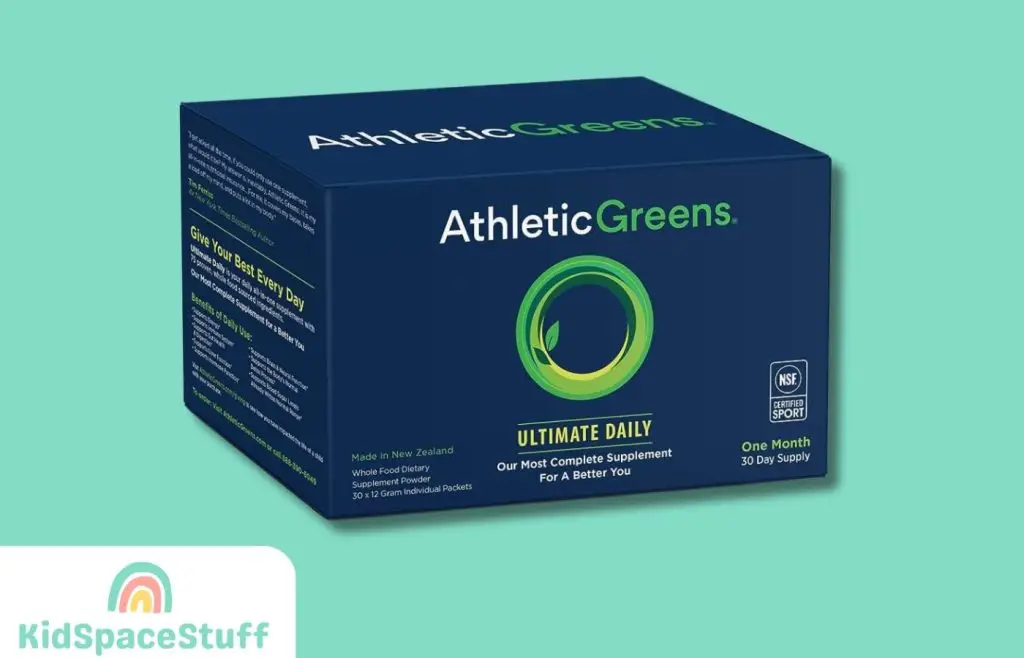Every parent has had that moment, standing in the health aisle, eyeing a container of Athletic Greens and pondering, “Is this a superfood miracle or a no-go for my kiddo?” Athletic Greens, championed by athletes and fitness enthusiasts, promises a blend of essential nutrients and probiotics. But determining what’s best can be problematic for our cherished little ones.
In this article, I’ll explore the composition of Athletic Greens, its benefits and potential drawbacks, and whether it’s a green light for children’s consumption.
Can Kids Drink Athletic Greens?

No, it’s not recommended for children to consume Athletic Greens, specifically the AG1 formula.
The supplement contains ingredients that have not been proven safe for children. Only adults over the age of 18 should consume AG1. While some greens powders can be consumed by children and may benefit their overall health, it’s essential to ensure the specific product is safe for kids before giving it to them.
What are Athletic Greens?
Athletic Greens, also known as AG1, is a popular greens supplement. It was popularized mainly through social media, with endorsements from Instagram influencers and other platforms.
The company behind this product focuses on providing nutritional supplements that offer a blend of whole-food-sourced ingredients rich in vitamins and minerals, commonly called micronutrients.
Nutritional Needs of Children
Every child needs proper nutrition to grow up healthy and strong. Just like plants need water and sunlight to thrive, children require specific nutrients to develop their bodies and minds. Here’s a simple breakdown of the nutritional needs of children:
- Proteins: Think of proteins as the building blocks of the body. They help in the growth and repair of tissues. Foods like meat, fish, eggs, and beans are excellent sources.
- Carbohydrates: These are the body’s primary energy sources. Foods like rice, bread, pasta, and fruit snacks provide the energy kids need for all their activities.
- Fats: Healthy fats support brain development and give energy. Avocados, nuts, and olive oil are good sources of healthy fats.
- Vitamins & Minerals: These tiny helpers ensure the body functions smoothly. For example, calcium (found in milk) is essential for strong bones, while vitamin C (found in citrus fruits) boosts the immune system.
- Water: Just as it sounds, water is vital! It keeps the body hydrated, helps digestion, and maintains body temperature.
Safety of Athletic Greens for Kids
Athletic Greens, or AG1, is a popular greens supplement for adults. When it comes to kids, things can be different. Here’s a simple explanation about its safety for children:
- Adult-oriented Formulation: AG1 is primarily made for adults. This means the amount and variety of nutrients it contains are based on adult needs.
- Nutrient Overload: Kids have different nutritional needs than adults. If they consume supplements designed for adults, they might get more of some nutrients than they need, which could be harmful.
- Always Consult a Pediatrician: Before giving any supplement to a child, it’s crucial to consult with a pediatrician. They can guide on whether a product like Athletic Greens suits the child’s specific needs.
Benefits and Risks of Athletic Greens
Athletic Greens (AG1) is a greens product that has a mix of vitamins and minerals. Even though it’s familiar with adults, children don’t like it as much. Here’s a straightforward explanation of what it does for kids and what it can do to them:
Benefits
- Nutrient Boost: AG1 can offer kids an array of vitamins and minerals, which might help supplement their diet if they’re picky eaters or lack certain nutrients.
- Whole Food Ingredients: The product is made of whole-food-sourced ingredients to boost the natural nutrient.
Risks
- Designed for Adults: AG1 is primarily tailored for adult nutritional needs, so it might need to be balanced for children.
- Potential Overdose: Kids have specific nutritional requirements. Taking a supplement meant for adults can lead to excessive intake of some nutrients.
- Unknown Reactions: Children might react differently to some ingredients, leading to allergies or digestive issues.
Alternatives to Athletic Greens for Kids
If you’re looking for alternatives suitable for children, here are five simple options:
- Multivitamin Gummies for Kids: These are designed for children and come in fun shapes and flavors. They provide a balanced dose of essential vitamins and minerals kids need.
- Homemade Smoothies: Blend fruits, vegetables, yogurt, and other nutritious ingredients. It’s a natural way to provide kids with vitamins, minerals, and fiber.
- Flavored Milk Supplements: Products like Pediasure or other kid-friendly nutrition drinks offer balanced nutrition tailored to children’s needs.
- Natural Nut Butter: Almond, peanut, or other nut butter is packed with protein and healthy fats. They’re great on toast or as a snack.
- Whole Food Supplements for Kids: Some brands offer powdered supplements made from whole foods, similar to Athletic Greens but formulated for children.
Here’s a great video from a performance nutritionist explaining about Athletic Greens.
Final Thoughts
To conclude, kids can potentially drink Athletic Greens, but it’s crucial to exercise caution as the supplement is primarily formulated for adults.
While it might offer a nutrient boost, the formulation is based on adult nutritional needs, which can differ significantly from children’s requirements. Overconsumption of certain nutrients can pose risks for children. It’s always paramount to consult with a pediatrician or nutritionist before introducing any supplements, including Athletic Greens, to a child’s diet to ensure safety and appropriateness for their specific needs.
KidSpaceStuff is a site dedicated to helping parents find the best interior design, activities, and inspiration for their kids.